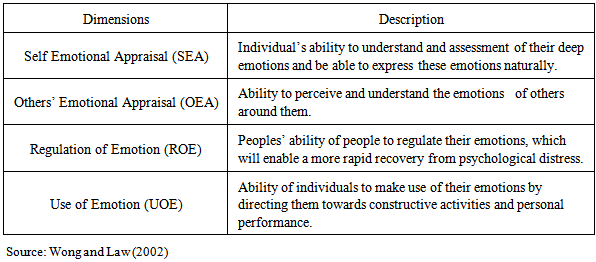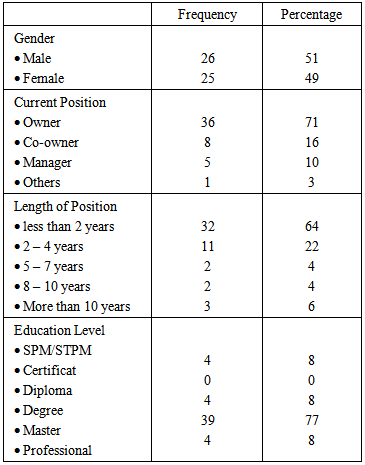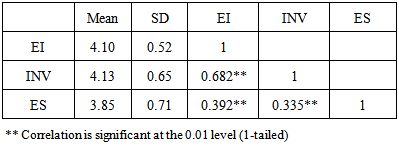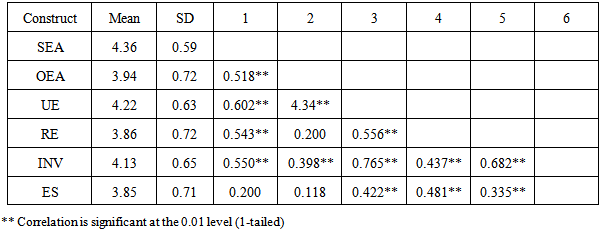-
Paper Information
- Next Paper
- Previous Paper
- Paper Submission
-
Journal Information
- About This Journal
- Editorial Board
- Current Issue
- Archive
- Author Guidelines
- Contact Us
American Journal of Economics
p-ISSN: 2166-4951 e-ISSN: 2166-496X
2015; 5(2): 285-290
doi:10.5923/c.economics.201501.37
Emotional Intelligence and Entrepreneurs’ innovativeness towards Entrepreneurial Success: A Preliminary Study
Rohana Ngah, Zarina Salleh
Malaysian Academy of Entrepreneurship and SME Development, Faculty of Business Management, Universiti Teknologi MARA
Correspondence to: Rohana Ngah, Malaysian Academy of Entrepreneurship and SME Development, Faculty of Business Management, Universiti Teknologi MARA.
| Email: |  |
Copyright © 2015 Scientific & Academic Publishing. All Rights Reserved.
Entrepreneurs’ ability to be successful is dependent on their resilience and ability to be innovative. The role of emotional intelligence in activating entrepreneurs’ innovativeness is yet to be explored in the entrepreneurial research. This preliminary study investigates the emotional intelligence, innovativeness and entrepreneurial success of entrepreneurs in Malaysia. The pilot study was carried out on 51 young entrepreneurs. The results indicate positive emotional intelligence can increase innovativeness that may lead to entrepreneurial success. Only “regulation of emotion in others” seems to be the most important dimension whereas other emotional intelligence elements seem to be less relevant to innovativeness and entrepreneurial success. Furthermore, there is no difference between male and female entrepreneurs in emotional intelligence and innovativeness but entrepreneurial success. This preliminary finding highlighted the importance of emotional intelligence especially on other elements of emotional intelligence in promoting innovativeness among entrepreneurs.
Keywords: Emotional intelligence, Entrepreneurs’ innovativeness, Entrepreneurial success
Cite this paper: Rohana Ngah, Zarina Salleh, Emotional Intelligence and Entrepreneurs’ innovativeness towards Entrepreneurial Success: A Preliminary Study, American Journal of Economics, Vol. 5 No. 2, 2015, pp. 285-290. doi: 10.5923/c.economics.201501.37.
Article Outline
1. Introduction
- Entrepreneurship is often redolent with the passion, energy, and creativity by discovering, generating, and stimulating opportunity [30]. Psychology is seldom been highlighted in entrepreneurship study especially related to the capability of an individual to analyze his emotions and values [9]. According to Boren [30], emotional intelligence has implications for entrepreneurial situations and social interactions such as negotiation, obtaining and organizing resources, identifying and exploiting opportunities, managing stress, obtaining and maintaining customers, and providing leadership. In addition, positive emotions influence an entrepreneur’s ability to turn their past experiences into present solutions through heuristic processing and deal effectively with the persistent stress [30]. In their study on emotional intelligence of entrepreneurs, Rhee and White [12] found that entrepreneurs demonstrated high level of self-confidence, trustworthiness, achievement orientation, service orientation, change catalyst, teamwork and collaboration. It raises a question on how emotional intelligence could trigger entrepreneurs’ innovativeness in the entrepreneurs themselves. Entrepreneurs’ innovativeness is important for the company to excel thus success inentrepreneurship ventures especially in global uncertainty. As innovation is a key success factor in entrepreneurship, it is important to know on how emotional intelligence could help entrepreneurs to be innovative by utilizing their emotion. The challenging world of entrepreneurship demand a strong emotion for entrepreneurs to embrace the challenges they are facing every day from the stakeholders be their employees, customers, suppliers, government, agencies and the list goes on. Studies have shown that entrepreneurs with higher EI tend to performance better. The entrepreneurship experience is said to be an extreme experience with full of uncertainty, ambiguity and stress [13], where only those with strong entrepreneurial characteristics can survive and sustained. Emotional intelligence has increasingly been argued to be highly useful concept in career success [20], organizational effectiveness [27], job satisfaction [17] [26], strategic decision [28], leadership [25], [11], organizational performance [25]. Recent times have seen researchers focusing on personal qualities of the entrepreneur that develops outstanding businesses. Sexton and Bowman [22] had characterized entrepreneur as tend to be 1) tolerant of ambiguous situations, 2) prefer autonomy (autonomy may be described as self-reliance, dominance, and independence), 3) resist conformity, 4) be interpersonally aloof yet socially adroit, 5) enjoy risk-taking, 6) adapt readily to change, and 7) have a low need for support. These factors cannot be easily delegated and communicated to the down lines which lead to intense stress or loneliness for the entrepreneur. Being stable emotionally is very crucial for the entrepreneurs with stress and loneliness. During the past few decades, there have been tremendous efforts on measuring the impact of emotional intelligence on the performance of entrepreneurs [25]; [20]; [21]; [1]. Innovation is a key aspect of entrepreneurship [24]. Entrepreneurs must be innovative besides being risk-taker and proactive where entrepreneurial orientation represents the policies and practices that provide a basis for entrepreneurial decisions and actions. Innovativeness is the predisposition to engage in creativity and experimentation through the introduction of new products/services as well as technological leadership via R&D in new processes [10]. Emotional Intelligence facilitates innovativeness and change in the organization [2]. The stressful and demanding environment requires a strong mental strength for entrepreneurs to withstand the competition and remain sustainable for a long time. Entrepreneurship is one of the ambiguous area in the literature and the relationship of emotional intelligence and entrepreneurial success has not extensively been explored [4]; [9]. However, very few studies of EI have been carried out in entrepreneurship as entrepreneurship studies tend to focus on finances, management, marketing etc. This study seeks to assess the relevance of three constructs, emotional intelligence and entrepreneurs’ innovativeness in entrepreneurial success. This preliminary study on emotional intelligence, innovativeness and entrepreneurial success would provide a future direction on this issue.
2. Literature Review
2.1. Emotional Intelligence
- EI can be defined as a set of individual social abilities or skills to monitor, discriminate and use-self and other’s emotions in order to regulate one’s thinking and action [23]. Previous studies suggested emotional intelligence can improve one’s life through appropriate training and education [5]. Emotional intelligence (EI) relate to the ability to identify and express emotions, emotional adjustment and using emotions as self-motivation and a means to motivate others [23], [5]. Emotional intelligence abilities are particularly salient to entrepreneurs because of their need to manage social interactions with other individuals. Social interactions include activities such as presenting to investors, gaining and maintaining customers, negotiating, as well as attracting, selecting, and handling employees, suppliers, and partners. Emotional intelligence is a combination of competencies. These skills contribute to a person’s ability to manage and monitor his or her own emotions, to correctly gauge the emotional state of others and to influence opinions [40]. EI is divided into four main areas: self-awareness, self-regulation, motivation, empathy and social skills [5]. It involves managing emotions so as to avoid task interference, delaying gratification to pursue goals, recovering from emotional distress and being conscientious [7]. In Cross and Tavaglione’s [4] study in Australia of high profile entrepreneurs; they found that entrepreneurs showed extremely high level in appraisal and expression of emotion; regulations and utilization of emotion. With a greater ability to identify, understand, and manage the emotional responses of themselves, and others, entrepreneurs will obtain a competitive advantage that sets their business performance apart from their competitors. As emotional intelligence is slowly being recognized, Wong and Law [15] has taken further action to developed new four dimensions emotional intelligence scale using Mayer and Salovey [23] model which composed of self-emotional appraisal (SEA), others’ emotional appraisal (OEA), regulation of emotion (ROE) and use of others’ emotion (UOE) which was reduced to 16 items. Table 1 shows the description of each dimension:
|
2.2. Emotional Intelligence and Entrepreneurs’ Innovativeness
- Emotional intelligence competencies distinguished outstanding performers where the role of self-management and relationship-management of EI competencies showed a higher innovative performance [16]. Gogal and Akilesh [6] found that interplay of three different and interrelated abilities termed as cognitive intelligence, emotional intelligence and social capital increased the innovativeness of individual and group. Meanwhile, Suliman and Al-Shaikh [18] in their study in Middle East found that emotional intelligence plays a strong role in promoting creativity and innovativeness in the organization. In addition, Kamalian et al. [19] in their study on emotional intelligence and corporate entrepreneurship, found motivation and self-awareness are most effective factors on innovation while self-regulation has the most on risk-taking and them empathy has the most effect on pro-activeness.
2.3. Emotional Intelligence and Entrepreneurial Success
- Entrepreneurial success can be defined as the standard used by entrepreneurs to judge the success of their business [31]. Ahmedtouglu et al. [21] argue that entrepreneurship is not solely about the creation of business but rather a set of activities or behaviours of entrepreneurs themselves. It is said that entrepreneurs with high EI are likely to hold different performance expectations with their entrepreneurial activities, and to rely on different priorities in conducting such activities, as compared to those with lower EI level [32]. According to Bahadori [2], people with high emotional intelligence can better solve problems more efficiently and to control their emotions. He further emphasized that EI is a conflict between what the person feels that it thinks. Brandstätter [21] performed an investigation on a random samples from two groups of people; first group comprised of 255 owners of small and medium sized businesses while the second group was associated with 104 people interested in setting up a private business. He discovered that owners who were founders were also emotionally more stable and independent than owners who had taken over their business from parents, relatives, or by marriage. Business owners who are emotionally stable and independent were more successful [7]. However, Yitshaki and Rothsein [25] found in their preliminary findings that entrepreneurs’ EI do not have a direct influence on organizational performance but managerial style does have direct influence.
2.4. Emotional Intelligence, Entrepreneurs’ Innovativeness and Entrepreneurial Success
- Successful entrepreneurs require a blend of analytical, creative and practical intelligence, which in combination constitute successful intelligence [7]. Reference has very often been made in the research literature to the role entrepreneurs play in stimulating innovation [14] which relate to the human personality but not to emotion. Ahmetouglu et al. [20] further found that individual, which has high EI tend to have higher effectiveness, informing creative dispositions and thus facilitating innovation. How the entrepreneur makes decisions and judgments in the experiential mode (emotional) rather than a rational mode imply the importance of emotional intelligence in entrepreneurial success [13]. They further emphasized that peak performance can be achieved when the entrepreneur is experiencing peak experience relating to emotional and spiritual. Positive moods have been shown to increase memory of positive information, self-assurance, enthusiasm, flexibility, creativity and inductive reasoning [4]. The feeling of joy can serve as a motivational tool that encourages entrepreneurs to push their performance to higher levels and achieve subsequent contentment and success [8]. Emotional intelligence is said to be a factor in superior performance [5] where emotion is one of the important elements in helping successful entrepreneurs in making a rational decision-making process as well as innovation process [13]. Moreover, Baron [3] agrees that positive emotions may enhance entrepreneurial creativity including opportunity recognition. It is also suggested that emotionally intelligence leaders behave in ways that promote the creativity of their employees.
3. Research Methodology
- To ensure the validity and reliability, this study employed the scales adopted from various authors and revised to fit into this study. The scales of emotional intelligence are taken from Wong and Law [15], innovativeness items are adopted from Rhee, Park and Lee [36]) and Calatone and Cavusgil [37], meanwhile, entrepreneurial success was from Cooper and Artz [35] and Hmieleski & Corbett [38]. The scale range from 1(totally disagree) to 5 (totally agree).The pilot test was done a group of young entrepreneurs who attended various training of entrepreneurship. Survey was conducted through online and face to face. All analysis is performed using SPSS version 21 to analyze this preliminary study.
3.1. Respondent Profile
- Table 2 shows the profile of the respondents.
|
3.2. Reliability Test
- Reliability test is an assessment of the degree of consistency between multiple measurements of a variable. The Cronbach alpha coefficient was used to measures (Nunnally, 1978). Reliability estimates (coefficient alphas) for the four dimensions of SEA, UOE, ROE,and OEA were .83, .85, .84, and .82, respectively. This is similar to study done by Wong and Law [15]. Table 3 presents the alpha coefficients that were above the required level of 0.7 as suggested by Malhotra et al. (1999).
|
3.3. Correlation Analysis
- The relationship between EI, INV and ES was investigated using Pearson correlation coefficient. Preliminary analyses were performed to ensure no violation of the assumptions of normality, linearity and homoscedasticity. There was strong correlation between EI and INV (r= 0.68, n=51, p<0.005), but moderate correlations between ES and EI (r= 0.39 n=51, p<0.005) and ES and INV (r=0.33 n=51, p<0.005). Table 4 shows the result of correlations.
|
|
3.4. Independent T-Test
- An independent t-test was carried out to compare the EI, INV and ES scores for male and female entrepreneurs. There was no significant difference in scores for males (M=4.14, SD= 0.49) and females (M= 4.04, SD = 0.54; t=0.677, p=0.675). The magnitude of the differences in the means was very small (eta squared = 0.009). In testing INV, there was also no significant difference in scores for males (M=4.32, SD= 0.54) and females (M= 3.92, SD = 0.70; t=2.314, p=0.181). The magnitude of the differences in the means was very small (eta squared = 0.008). However, in testing ES, there was a significant difference in scores for males (M=4.04, SD= 0.53) and females (M= 3.65, SD = 0.811; t=1.988, p=0.014). The magnitude of the differences in the means was moderate (eta squared = 0.07).
4. Discussion
- The entrepreneurship process is a very challenging process therefore it requires a strong mental and stable emotion for an entrepreneur to be able to face the competition. EI is much more than having a pleasant personality or good people skills, although that all forms part of it [40]. In reality, EI affect every aspects of our lives; relationships with others either personal or professional lives [39]. How effective can entrepreneurs capitalize of diverse relationships depends heavily on their internal EI. Unable to fully utilize EI would dampen entrepreneurs’ opportunity to innovation thus success. The finding shows that EI is important for entrepreneurs to be innovative. This is similar to Dincer et al. [25] finding that emotional intelligence is positively related to innovative work behavior. Emotion has placed strong role in innovation especially in understanding consumer’s needs and wants [34]Regulation of others’ emotion has strong impact on innovativeness and entrepreneurial success compared to other emotional intelligence dimensions. This finding is similar to Zhou et al. [31] where regulation of others’ emotion is dominant compared to other dimensions of emotional intelligence. This is true because entrepreneurs might be sensitive about stakeholders such as customers, employees and community in general in order to survive and sustain in the competition [38]. This is also suggested by Fukuda [34], that innovation becomes true innovation when it meets the expectations of customers and when they feel they have new innovative products. It is because innovation lies in the hearts of customers [34]. This study also found that there are no differences in gender in term of emotional intelligence and innovativeness for entrepreneurial success. Male entrepreneurs’ perception of entrepreneurial success is higher compared to female. This is because male and female entrepreneurs tend to derive satisfaction from different sources; whereas male entrepreneurs place greater emphasis on status-based sources of business success, female entrepreneurs place greater emphasis on socio-emotional sources of business success such as building satisfying relationships with employees [33].
5. Conclusions
- This study is another contribution to the knowledge of entrepreneurship. As Malaysia is investing heavily on entrepreneurship efforts, EI should not be left out. As emotional intelligence abilities can be learned and taught, entrepreneurs who are able to exploit their emotional intelligence would able be to create competitive in negotiations, obtaining and maintaining customers as well as providing leadership and maintain order which is vital to entrepreneurial success [41]. Entrepreneurs should leverage their emotional intelligence to increase creativity and innovation in the organization by exploiting it for their benefits. The power of emotion would help entrepreneurs to be good leaders and thus able to inspire and motivate their employees to be innovative and creative in their organizations [39]. This study has a number of limitations. First of all, the number of respondents is too small to derive to any conclusion. Furthermore, most of participants are young entrepreneurs who have just started their venture. The findings from this preliminary study would allow a more thorough means to examine the impact of entrepreneurs’ EI on perceived innovativeness and entrepreneurial success on bigger scale.For future research, emotional intelligence should be explored in other perspective as mentioned by Ho [27] where single emotional intelligence might not adequate. Other factors such as entrepreneurial culture, entrepreneurial environment and entrepreneurial orientation should be explored together with emotional intelligence.
 Abstract
Abstract Reference
Reference Full-Text PDF
Full-Text PDF Full-text HTML
Full-text HTML



